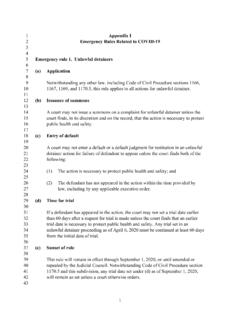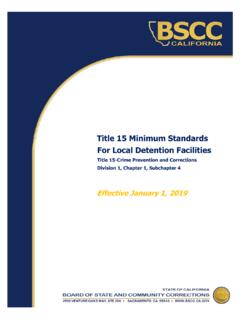Transcription of Involuntary Treatment for Mental Illness - Ohio
1 Vern Riffe Center 77 South High Street, Ninth Floor Columbus, Ohio 43215-6136 Telephone (614) 466-3615 Brief Members Brief An informational brief prepared by the LSC staff for members and staff of the Ohio General Assembly Author: Lisa Musielewicz, Attorney Reviewer: Laurel Mannion, Division Chief Volume 134 Issue 11 February 10, 2021 Involuntary Treatment for Mental Illness Overview .. 2 Emergency hospitalization .. 3 Custody and transport .. 3 Application for emergency admission (form DMH-0025) .. 4 Examination .. 5 Three-day hold .. 5 Judicial hospitalization .. 6 Affidavit of Mental Illness .. 6 Review of affidavit; temporary detention orders .. 7 Prescreening investigation .. 7 Hearing .. 8 Treatment plan .. 10 Continued commitment .. 11 Immunity and liability .. 11 Good faith commitment .. 11 Bad faith commitment.
2 11 Categories .. 12 Notice of rights .. 13 State-operated psychiatric hospitals .. 13 Operating costs .. 14 Court costs .. 15 Ohio law establishes two processes under which Involuntary Treatment for Mental Illness may be initiated: (1) emergency hospitalization, sometimes called pink-slipping, which may be used only by certain health professionals or law enforcement officers when an emergency exists and (2) judicial hospitalization, which may be used at any time by any person including court personnel or a concerned family member or friend. The individual s Mental Illness must be severe enough that he or she falls within at least one of five categories to be a mentally ill person subject to court order as defined in statute. Under certain circumstances, an individual with a Mental Illness who was initially subject to emergency hospitalization may later become subject to judicial hospitalization.
3 Involuntary Treatment for Mental Illness Members Brief P a g e | 2 Office of Research and Drafting LSC Legislative Budget Office Overview Some individuals with severe Mental Illness refuse Treatment , often because they lack awareness of their Illness and do not think that they are If an individual with a Mental Illness does not voluntarily seek Treatment , and the Mental Illness is severe enough that it makes the individual come within one or more of five statutory categories to be considered a mentally ill person subject to court order, Treatment on an Involuntary basis may be appropriate. Under Ohio law, a Mental Illness is a substantial disorder of thought, mood, perception, orientation, or memory that grossly impairs judgment, behavior, capacity to recognize reality, or ability to meet the ordinary demands of Treatment on an Involuntary basis is also referred to as Involuntary commitment, civil commitment, or court-ordered Treatment .
4 In Ohio, there are two processes by which Involuntary Treatment for Mental Illness may occur, as described in the table Involuntary Treatment for Mental Illness Process Initiator When How Emergency hospitalization ( pink-slipping ) ( ) A psychiatrist, licensed physician, licensed clinical psychologist, clinical nurse specialist who is certified as a psychiatric- Mental health clinical nurse specialist by the American Nurses Credentialing Center, certified nurse practitioner who is certified as a psychiatric- Mental health nurse practitioner by the American Nurses Credentialing Center, health officer, parole officer, police officer, or sheriff. During an emergency when an expedited process is needed. Complete and file with the probate court the Application for Emergency Admission (form DMH-0025), available from the website of the Ohio Department of Mental Health and Addiction Services (OhioMHAS).
5 Initiator must specify (1) the reasons for the belief that the individual is a mentally ill person subject to court order and represents a substantial risk of physical harm to self or others if allowed to remain at liberty pending examination and (2) the circumstances under which the individual was taken into custody. 1 Treatment Advocacy Center, What Can You Do If Someone with a Serious Mental Illness Refuses Treatment ?, available at 2 (A). 3 Mahoning County (Ohio) Probate Court, Video, Ohio Pink Slips for Law Enforcement Officers, available at ; see also Supreme Court of Ohio, Civil Commitment of the Mentally Ill, available at Involuntary Treatment for Mental Illness Members Brief P a g e | 3 Office of Research and Drafting LSC Legislative Budget Office Involuntary Treatment for Mental Illness Process Initiator When How Judicial hospitalization ( ) Any person.
6 At any time. An individual who was subject to emergency hospitalization becomes subject to judicial hospitalization if that individual declines to be admitted as a voluntary patient and the chief clinical officer of the facility believes that the individual is a mentally ill person subject to court order. Complete and file with the probate court the Affidavit of Mental Illness prescribed in The affidavit requires an allegation that the individual meets one or more categories to be a mentally ill person subject to court order and a statement of alleged facts sufficient to indicate probable cause to believe that the individual is a mentally ill person subject to court order. The Affidavit of Mental Illness may be accompanied, or the court may require that it be accompanied, by a certificate of a psychiatrist, or a certificate signed by a licensed clinical psychologist and a certificate signed by a licensed physician, stating that the person has examined the individual and is of the opinion that the individual is a mentally ill person subject to court order or a statement that the individual has refused examination.
7 Emergency hospitalization Custody and transport Any of the following who has reason to believe that an individual (1) meets one or more of the five statutory categories to be a mentally ill person subject to court order (see Categories, below) and (2) represents a substantial risk of physical harm to self or others if allowed to remain at liberty pending examination, may take the individual into custody and immediately transport him or her to a hospital licensed by OhioMHAS4 or a general hospital not licensed by OhioMHAS:5 A psychiatrist; 4 As discussed below, there are six OhioMHAS-operated regional psychiatric hospitals in Ohio. In addition to those facilities, there are other hospitals in the state that are licensed by OhioMHAS to care for patients with Mental Illness .
8 5 Involuntary Treatment for Mental Illness Members Brief P a g e | 4 Office of Research and Drafting LSC Legislative Budget Office A physician; A clinical psychologist; A clinical nurse specialist (CNS) who is certified as a psychiatric- Mental health CNS by the American Nurses Credentialing Center; A certified nurse practitioner (NP) who is certified as a psychiatric- Mental health NP by the American Nurses Credentialing Center; A health officer (any public health physician, public health nurse, or other person authorized or designated by a city or general health district or a board of alcohol, drug addiction, and Mental health services (ADAMHS) to perform the duties of a health officer under Chapter 51226); A parole officer; A police officer; or A sheriff. Each ADAMHS board must establish emergency and crisis care for the residents of its For this purpose, an ADAMHS board will contract with one or more organizations that provide these services.
9 These organizations employ health officers who may initiate emergency hospitalization 24 hours a day, seven days a week. In Franklin County, for example, this service is provided by Netcare Access for adults and Nationwide Children s Hospital for Accordingly, a concerned person who believes an individual needs emergency hospitalization may call the crisis care organization s crisis Application for emergency admission (form DMH-0025) When the individual believed to be a mentally ill person subject to court order (the respondent ) is taken into custody by one of the persons listed above and transported to a hospital, every reasonable and appropriate effort must be made to do this in the least conspicuous manner The person initiating the emergency hospitalization must then do all of the following:11 6 (J).
10 7 (A)(6). 8 Netcare Access, Who We Are, available at ; Nationwide Children s Hospital, Crisis Services, available at 9 See, , Netcare Access, Crisis Center, available at 10 11 (C) and (B) and (C); see also Supreme Court of Ohio, note 3, above. Involuntary Treatment for Mental Illness Members Brief P a g e | 5 Office of Research and Drafting LSC Legislative Budget Office 1. Submit to the hospital an Application for Emergency Admission or form DMH-0025 (available from OhioMHAS s website12), indicating: a. The category or categories that the initiator believes are met to make the respondent a mentally ill person subject to court order; b. The circumstances under which the respondent was taken into custody and the reason for the initiator s belief that hospitalization is necessary. (The form is colloquially referred to as a pink slip because it is sometimes printed on pink paper.)







